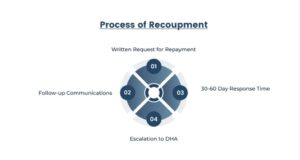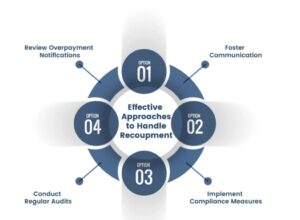Introduction
What is recoupment in Medical Billing or what does recoupment mean? These are the queries that Medical Billing professionals and healthcare practices handling their own Medical Billing Services have to deal with such as Refund Issues and Insurance Recoupment. Recoupment means recovery of spent or lost funds and it has larger implications. Particularly speaking in the perspective of healthcare industry, it happens when insurance payment is higher than the actual healthcare services provided to the patient. Such a situation creates problems for healthcare providers, negatively impacts the practice’s income, and in some cases leads to legal concerns. Recoup defines or even emphasizes the importance of efficient and accurate Medical Billing Services to prevent overpayments. This challenging scenario is preventable if thorough billing details are acquired, records are maintained, and the practice’s finance is kept on track.
When an insurance company encounters overpayment, it tries to recover the extra money, possibly leading to strained relationships between the insurer and healthcare provider.
Nevertheless, it is not always the healthcare providers who are in a disadvantaged or vulnerable position. Recoupment is a triangular process involving all parties: the patient, the insurance company, and the healthcare providers.
Let’s explore its diverse aspects in detail to fully understand as what is the definition of recoupment and the meaning of recoupment etc.
Overpayment Factor
Overpayment occurs when a healthcare provider receives money more than the actual amount, he deserves for the services he provided. There could be a few reasons behind it such as incorrect insurance details and billing mistakes which need to be corrected to ensure financial accuracy. Sometimes patients more than the due and later realize that their insurance covers more and they owe less. But patients need not worry! There are specific laws in place to help patients recover extrapair amounts, and healthcare providers are required to abide by these regulations to ensure trust-building and transparency. What exactly is the recoup definition in Medical Billing? Here we provide a recoupment definition and explanation below.
Recoupment in Medical Billing?
Recoupment involves an insurance company reclaiming funds it previously paid to a healthcare provider. In most of the cases, it occurs when an overpayment is found due to discrepancies or mistakes. Insurance recoupment ensures that payments are equivalent to the services rendered and accurately billed.
Process Applied in Recoupment
When an overpayment is found, the insurer contacts the provider and requests repayment paid previously to a physician. There are three ways to manage such as adjusting future payments, recovering funds from claims, requesting direct repayment, and correcting billing errors.
This process is crucial to ensure smoother financial operations and avoid disruptions to the provider’s cash flow.
What Are the Most Common Causes of Recoupment?
The most common causes behind recoupment are Medical Billing errors that lead to potential revenue loss for healthcare facilities. In addition to that, there are also certain other issues that often lead to recoupment including overpayment, duplicate payments, duplicate billing, coding mistakes, documentation errors, lack of medical necessity, non-compliance with policies, and eligibility issues.
Recoupment Management in Medical Billing
There are several steps to follow to manage the recoupment of Medical Billing to address any overpayment or error. Typically, this process starts with the insurer notifying healthcare providers about the discrepancy and issuing a formal request for repayment. If this process is effectively managed, payments are transparently corrected.
Process of Recoupment
Initially, the process begins with a written request for repayment which is followed by further communication such as phone calls or emails. Typically, healthcare providers have 30 to 60 days to respond. In case if insurance company receives no response from a provider within this period, the case may go to the Defense Health Agency (DHA) for further action. Shortly speaking, when a project is overfunded, the excess money is recouped and returned to its source.
- Written Request for Payment
- Follow-Up Communication
- 30-60 Day Response Time
- Escalation to DHA
If a healthcare provider disputes the recoupment claim, they can exercise the right to file an appeal for further review. DHA may use a diverse set of options in the given specific scenario such as recovering amounts from federal funds, taking legal action, deducting overpayments from future claims, and if necessary, involving credit bureaus.
How far back can an insurance company recoup a payment?
The time frame for an insurance company to recoup a payment depends on the laws and regulations of the specific jurisdiction and the terms of the contract between the insurance company and the healthcare provider. It depends on contractual agreements, fraud or misrepresentation, state laws, and regulations.
What is The Difference Between Recoupment and Refund in Medical Billing?
Recoupments and refunds are both used to fix the issue of overpayment but they operate in a different way. Recoupment is about recovering the overpaid funds, most probably initiated by the insurance company or payer. Contrarily, a refund involves directly returning excess money to the patient, often due to billing mistakes or changes in coverage.
Difference Between Recoupment and Refund
Recoupment refers to the recovery of overpaid funds by an insurance company or payer from a healthcare provider. In contrast, a refund involves returning excess money directly to the patient or another responsible party, such as a guarantor. Both processes address overpayment but through different procedures and mechanisms.
Examples Of Recoupment
If an insurance company realizes that it overpaid a physician or healthcare facility $150 for a service, it may request the provider to either adjust future payments to recover the overpayment or return the extra amount. This process only works on the condition that the insurance company reimburses the correct amount for the services provided and this also aligns with recoupment meaning.
Examples To Understand Refund
If a patient overpays $200 for a service and later his insurance covers $150, the provider will return a $50 refund to the patient. This returning excess funds correct the billing mistake and accordingly adjusts the patient’s account.
Refunds To Patient
If the patient is a copay insurance holder and overpays to the provider, then inform the patient by offering a credit note for the next services patients take. This leaves a positive impression on patients about your clinic. To avoid any legal consequences, send a check to the patient within ten days for an immediate refund from the refund issued through the submitted details.
Refunds to Insurers
After getting it confirmed from a participating provider, the insurer requests to again process the claim with the updated amount. The process is initiated through the refund request form in a written document shape to avoid any inconvenience in the future. After, receiving the written request from the insurer, assign and send the bank check to the insurer at the right address. If the credit processing does not satisfy the insurer, then proceed with physical check mailing.
How Recoupment Affects Healthcare Providers
Recoupments have significant counterproductive implications on the practice of healthcare providers as they disrupt financial stability and increase administrative demands. Reclaiming overpaid funds causes disruption in cash flow and requires additional efforts to fix and resolve these issues.
- Financial Implication: Affects overall financial health of healthcare facility.
- Administrative Effort: Involves extra efforts to handle recoupment requests
- Public Perception: This may raise questions about the professional credibility of healthcare providers.
- Regulatory Scrutiny: Can lead to more reviews and audits by oversight bodies
These issues reflect how important Medical Billing and Coding are to ensure the financial stability and operational efficiency of a healthcare facility to safeguard the reputation of a healthcare facility.
Best Approaches to Handle Recoupment?
There are several key strategies to effectively manage recoupment to minimize its impact and resolve issues. Healthcare providers can effectively manage recoupment situations by carefully addressing overpayment notices and maintaining clear communication with payers. Robust compliance and regular audit programs prevent future disputes and enhance the accuracy of billing practices.
What Are the Best Practices to Minimize Recoupment?
The following practices can prove the best for healthcare providers to minimize recoupment.
Accurate Documentation: ensure that medical records are accurate and accurately reflect the services physicians provide to patients.
Thorough Claims Reviews: Implement claim scrubbing processes to identify and correct errors before submission.
Regular Staff Training: Prioritize providing your staff with regular training regarding the updated payer policy, coding standards, and compliance requirements.
Proactive Audits: Conduct internal audits to detect and address issues before claims are submitted.
Timely Appeals: It is imperative to waste no time thinking about challenging recoupment decisions when necessary and you have proper documentation as proof that you have been overfunded. The quicker you challenge, the easier to reimburse.
Coverage Verification: Ensure Prior Patient Coverage Verification as part of the scheduling process.
Consider Outsourcing: Outsource your practice’s Medical Billing practice to a well-reputed and reliable Medical Billing company.
Effective Approaches to Handle Recoupment
Here we suggest few important strategies that will help you minimize the counterproductive impacts of recoupment.
These important strategies include:
Reviewing Overpayment Notifications: Examine the details of the recoupment request to find out the reason behind the overpayment.
Fostering Communication: Have effortless discussions and dialogue with payers to ensure cooperation and transparency.
Conduct Regular Audits: Perform billing practices’ reviews frequently to catch errors and fix them.
Follow Compliance Measure: Establish strict policies to prevent billing errors and fraud.
By following the strategies suggested above, healthcare providers can effectively manage and resolve recoupment issues, ensuring strategic and operational excellence and sustainable financial prosperity.
What is a Medical Billing Refund?
After having thoroughly studied recoupment in Medical Billing from multiple perspectives, now we must learn about refunds in billing. It is a technical process to return excess money. Refunds in Medical Billing involve returning excess amounts beyond what is owed by stakeholders such as healthcare providers, patients, or other parties, by a recoupment request. A few such situations put healthcare providers’ reputations at stake when it is found that the healthcare provider intentionally charged the patient more than the services he rendered, leaving him vulnerable to litigation in instances where immediate return of the exact amount is denied.
Let’s explore together the difference between refund and recoupment:
Common reasons leading to refunds in Medical Billing
- Incorrect procedural codes, diagnoses, and lags in documentation or duplicate billing are some of the common billing errors that lead to refund requests.
- In some situations, insurance providers change their policies and guidelines, and payers must then take a refund from healthcare providers.
- The insurance companies can also take legal action if they discover some type of fraud.
- Another reason could be a mismatch between the documentation of physicians and the treatment given to the patients.
Outsourcing Medical Billing Services is the most Viable Option to Reduce Recoupment or Refund.
Lots of small practices believe that in order to produce exceptional healthcare results, it is imperative to spend more time treating patients than dealing with administrative tasks such as Medical Billing. Rather than installing infrastructure facilities, and hiring and training additional administrative staff, the most productive option is to outsource it to the Medical Billing Company to extract maximum clinical, financial, and administrative benefits from healthcare practice.
In this regard, Pro Medical Billing Solutions is an incredibly reliable and best-results-orienting organization both in terms of operational efficiency and financial stability. Our billing professionals are extensively experienced, unwaveringly dedicated, and exceptionally competent.
Your sustainable practice’s growth is the ultimate objective of our business.
FAQs
What is Recoupment in Medical Billing?
Recoupment in Medical Billing refers to the process where insurance payers recover overpaid amounts from healthcare providers due to billing errors, duplicate claims, or other discrepancies.
Why Do Insurance Companies Initiate Recoupment?
Insurance companies initiate recoupment to correct overpayments caused by coding mistakes, non-covered services, or provider non-compliance with billing guidelines.
How Can Healthcare Providers Prevent Recoupment?
Providers can prevent recoupment by ensuring accurate medical coding, timely claim submission, and adhering to payer-specific billing rules and guidelines.
What Are the Common Reasons for Overpayment Leading to Recoupment?
Overpayments often result from duplicate claims, incorrect patient information, upcoding, or billing for services not covered under the patient’s insurance plan.
Can Providers Dispute a Recoupment Request?
Yes, healthcare providers can dispute a recoupment request by submitting an appeal with supporting documentation to prove the validity of the original claim.
What Are the Consequences of Ignoring a Recoupment Request?
Ignoring a recoupment request can lead to withheld future payments, increased audits, and potential legal action from insurance payers.
How Does Pro Medical Billing Solutions Handle Recoupment Efficiently?
Pro Medical Billing Solutions excels in managing recoupment by leveraging advanced audit tools, ensuring accurate claim submissions, and maintaining compliance with payer guidelines. Their team proactively identifies billing discrepancies, minimizes overpayment risks, and provides expert dispute resolution services to protect providers’ revenue streams.


